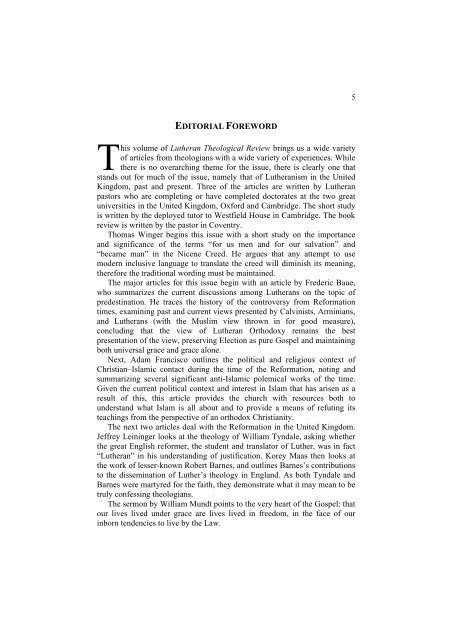LUTHERAN THEOLOGICAL REVIEW - Brock University
LUTHERAN THEOLOGICAL REVIEW - Brock University
LUTHERAN THEOLOGICAL REVIEW - Brock University
You also want an ePaper? Increase the reach of your titles
YUMPU automatically turns print PDFs into web optimized ePapers that Google loves.
5<br />
EDITORIAL FOREWORD<br />
T<br />
his volume of Lutheran Theological Review brings us a wide variety<br />
of articles from theologians with a wide variety of experiences. While<br />
there is no overarching theme for the issue, there is clearly one that<br />
stands out for much of the issue, namely that of Lutheranism in the United<br />
Kingdom, past and present. Three of the articles are written by Lutheran<br />
pastors who are completing or have completed doctorates at the two great<br />
universities in the United Kingdom, Oxford and Cambridge. The short study<br />
is written by the deployed tutor to Westfield House in Cambridge. The book<br />
review is written by the pastor in Coventry.<br />
Thomas Winger begins this issue with a short study on the importance<br />
and significance of the terms “for us men and for our salvation” and<br />
“became man” in the Nicene Creed. He argues that any attempt to use<br />
modern inclusive language to translate the creed will diminish its meaning,<br />
therefore the traditional wording must be maintained.<br />
The major articles for this issue begin with an article by Frederic Baue,<br />
who summarizes the current discussions among Lutherans on the topic of<br />
predestination. He traces the history of the controversy from Reformation<br />
times, examining past and current views presented by Calvinists, Arminians,<br />
and Lutherans (with the Muslim view thrown in for good measure),<br />
concluding that the view of Lutheran Orthodoxy remains the best<br />
presentation of the view, preserving Election as pure Gospel and maintaining<br />
both universal grace and grace alone.<br />
Next, Adam Francisco outlines the political and religious context of<br />
Christian–Islamic contact during the time of the Reformation, noting and<br />
summarizing several significant anti-Islamic polemical works of the time.<br />
Given the current political context and interest in Islam that has arisen as a<br />
result of this, this article provides the church with resources both to<br />
understand what Islam is all about and to provide a means of refuting its<br />
teachings from the perspective of an orthodox Christianity.<br />
The next two articles deal with the Reformation in the United Kingdom.<br />
Jeffrey Leininger looks at the theology of William Tyndale, asking whether<br />
the great English reformer, the student and translator of Luther, was in fact<br />
“Lutheran” in his understanding of justification. Korey Maas then looks at<br />
the work of lesser-known Robert Barnes, and outlines Barnes’s contributions<br />
to the dissemination of Luther’s theology in England. As both Tyndale and<br />
Barnes were martyred for the faith, they demonstrate what it may mean to be<br />
truly confessing theologians.<br />
The sermon by William Mundt points to the very heart of the Gospel: that<br />
our lives lived under grace are lives lived in freedom, in the face of our<br />
inborn tendencies to live by the Law.













